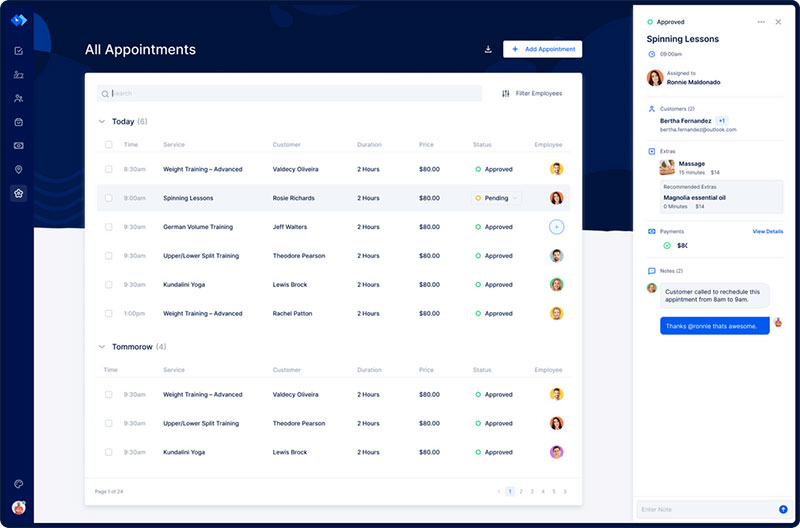The basic definition of mentoring is to give advice or training. Through mentoring, knowledge and experience transfer from one person to the other. A mentor shares personal experience and expertise with their mentee. They provide guidance and help the mentee to grow professionally.
There are a lot of benefits to a mentoring relationship. Both the mentor and mentee benefit, as does the company they work for. There have been many studies showing the positive impact mentoring programs have.
Mentoring programs help mentees feel empowered, gain confidence, and even get promoted. It can improve the mental health of mentees and bring people in the workplace together. Mentorship programs are a key factor in the growth and unity of an organization.
There is tons of information on the internet about mentoring programs. This article covers the best mentorship statistics and information out there.
Mentoring Statistics for Employee Retention
As businesses move forward from the COVID-19 pandemic, mentoring programs have become essential. Nowadays, employees with skills that are in demand call more of the shots than they used to. Most employees have no trouble walking away from a job that does not offer the work/life balance they are looking for. Employees now want work environments that offer them a chance to make meaningful connections and acquire new skills.
According to research, 85% of employees around the world currently don’t feel engaged in their work. This has become a real problem with many contributing factors. It is not an easy problem to solve. But there is hope. One study in Hong Kong identified some key factors that affect employee engagement. Among them, people left jobs because there wasn’t enough recognition, leadership, or compensation. People also quit because there weren’t enough opportunities for personal and professional development. But mentoring programs address these very factors.
In the U.S., businesses lose up to one trillion dollars because of high employee turnover. It can cost up to double the salary of one employee to replace them. In 2021, over 65% of people were searching for a different job. That trend will no doubt continue. However, 94% of employees asked said they would stay with a company longer if they felt like they could develop and grow within their company.
Workers at every management level are much less likely to think about quitting if they work with a mentor. Of the people interviewed who had a mentor, nine in ten workers said they were happier with their careers.
Of those who don’t have a mentor, for in ten workers said they have considered quitting in the last three months.
There is a 50% higher retention rate among those who had been in a mentoring program. 93% of mentees said their mentoring relationships were useful to them.
“Mentoring programs” is #4 on a list of strategies for learning and development released by an L&D Social Sentiment Survey in 2022. The year before, “mentoring programs” was #6 on this same list. That was a larger rank increase than any other listed item.
Mentoring for Organizations Statistics
According to one report, 84% of Fortune 500 companies in the U.S. use mentoring programs. Their goal is to use mentoring to develop, engage with, and retain the talent in their companies. 90% of Fortune 250 firms already had mentoring programs in place. Among Fortune 100 companies, 96% said they had a strategy for implementing mentoring programs. This strategy also included increasing development opportunities.
Another study showed that higher-ranking Fortune 500 companies are more likely to have mentoring programs. During the pandemic, Fortune 500 companies with a mentoring program did better than those without one.
Companies with a mentoring program in place during 2020 had 15% better profit changes than other companies on average. During the instability that came with the pandemic, companies that had a mentoring program in place did 53% better financially. In contrast, those without mentoring programs did 43% worse than other companies on average. It’s no wonder that the pandemic saw a 30% increase in organizations with mentorship programs.
According to this report, 67% of businesses saw an increase in productivity because of mentoring.
55% of businesses said they felt that having mentorship programs made a positive impact on their profit. Somewhere from 56% to 71% of organizations now use some kind of mentoring program.
Among people who own small and medium-sized business owners, only 25% have a mentor. Of those who do have a mentor, 92% of small businesses said that it has made a big impact on their survival and growth.
68% of employees who have stayed with their company five years or more say that there is lots of support for the people who want to fill leadership roles. 68% also agree that the company encourages younger employees to reach out for those leadership roles. 71% of people who had a formal mentor said they felt their company gave them opportunities to advance their careers. Of those who didn’t have a mentor, only 47% felt they had growth opportunities at their job.
Among employees who quit their job in two years or fewer, 71% feel their leadership skills aren’t being cultivated. In addition, 57% feel that they are getting overlooked when there are leadership positions to fill.
In summary, successful businesses make mentoring a priority, and for good reasons. However, only about 37 percent of employees currently have a mentor.
Mentoring for Career Development Statistics
Mentoring relationships last for an average of 3.3 years. 41% of people state that their mentoring relationship has set, formal goals in place.
On average, mentors and mentees spend about four hours a month talking. The majority of mentees asked said they meet with their mentors once a month or less. The little amount of time spent with mentor and mentee may have to do with how accessible the mentor is. Only 19% of employees with a mentor said that it was easy to schedule time to spend with their mentor.
During this time of the Great Resignation, workers have expressed their desire to grow and learn. Over 66% of workers asked said they would be willing to retrain or reskill for a new job. But people no longer have an interest in learning solely through a digital course. Now, people prefer not to learn on their own, but through a one-on-one, formal mentoring program.
Of the people who enrolled in mentoring programs, 25% of employees had a salary grade change. Among those who did not participate in a mentoring program, only 5% had a salary grade change.
Mentees are five times more likely to receive promotions than those who have no mentor.
Mentors are also six times more likely to get promoted. It’s also worth noting that 89% of people who had a mentor will become mentors themselves.
89% of people with mentors feel like their work is valued and appreciated by colleagues. Of those who don’t have mentors, only 75% of people feel their work is appreciated. 79% of those involved in a mentorship program of some kind felt they were well-paid at their job. 89% said they felt that their contributions were appreciated and valued.
Mentorship is an essential element of employee growth. But many times, the relationship between mentor and mentee forms unintentionally. Many companies still don’t have formal mentoring programs in place. So 61% of mentoring relationships form informally.
97% of people with mentors say their mentors are valuable. 87% involved in mentoring programs feel that their mentoring relationships empower them. They say it helps them to have more confidence. 84% said that their mentoring relationships are a source of inspiration for both mentor and mentee.
Mentors in one study conducted showed lower levels of anxiety. They also described their job as more meaningful in contrast to those who haven’t mentored others.
A happiness survey from CNBC in 2019 showed that half of their employees had a mentoring relationship. Those who did said they were happier with their job. 91% said they were happy, and 57% said they were very satisfied with their jobs.
81% of people in a mentorship program said their mentor works in a similar industry or field. 61% said their mentor also works for the same company as them. Some 70 percent of workers would like to have multiple mentors. This may point to a desire for different perspectives and a variety of opinions to help foster growth.
27% of mentors advocate for their mentee’s promotion.
73% of sponsors look at the track record of success of a potential protégé. Then they select one that has ability as well as potential.
Leaders who mentor or sponsor other employees are twice as likely to know about what concerns their junior colleagues.
Mentoring for Diversity, Equity, and Inclusion (DEI)
There is an increasing amount of evidence showing that people work better in an inclusive environment. When workers feel included, they often perform better and engage more with their job.
One survey by CNBC/SurveyMonkey found that 80% of workers would prefer to work for a company that makes DEI a priority. Organizations with racially diverse teams, especially among the management, can be up to 33% more profitable.
However, it does matter whether or not the mentor and mentee come from a similar diversity group. 41% of workers from various diversity groups would prefer a mentor from the same diversity group as them.
The Women’s Dermatologic Society conducted a survey showing that 75% of women would rather have a female mentor.
65% of workers say that DEI is even more important in the wake of the Black Lives Matter movement.
80% of employees feel that DEI mentorship programs foster inclusivity, skill-building, and sponsorship.
Men are less likely to have mentors than women. (54% of women compared to 48% of men.) Still, 63% of women employees have not had a formal mentor. Without a mentor, women struggle their way up to management. Once in that position, one study showed that 64 percent of women go on to mentor others. Another study showed that,
of women who are in leadership positions, 11. 27% mentor other people.
One research report from YouGov for Vodafone revealed more interesting mentoring statistics. It showed that companies more often nurture talent when women make up 30% or more of their management positions. Some 27% of women in management already mentor someone, and 17% are looking for a junior employee to support.
According to one study, mentoring raises the percentage of minority groups in management. While some diversity initiatives resulted in a 2% to 18% increase of minority representation, mentorship resulted in a 9% to 24% increase.
This study also showed that mentoring minorities and women resulted in more promotion and retention rates. Mentorship statistics showed a 15% to 38% increase in these areas.
38% of DEI groups prefer a traditional, one-on-one style of mentorship. This makes it the most popular kind of mentoring. It is closely followed by reverse one-on-one mentoring, which 31% of people prefer.
Of those who feel happy with their career development, 67% of white workers and 56% of people of color have mentors.
Your mentorship success story starts with a scheduling app to streamline your calendar
Staying organized has never been easier.
You can now manage your business and grow your brand with a single, powerful software that keeps all of your appointments in line, your clients organized and your business booming.
Trafft is perfect for business owners who need to streamline their booking experience both for their staff and their clients.
Trafft handles everything for you, even sending automated email or SMS reminders to your clients. No-shows? Not anymore!
The Trafft booking software adapts to different industries for a blissful online booking experience and employee management.
Want to know more? Check out Trafft’s awesome features to see what you are missing.
Mentoring Millennials and Gen Z
The labor market is shifting and changing. Alight predicts that by 2025, millennials will make up 42.5% of the workforce. By that same year, 28.2% of the workforce will be Gen Z.
63% of millennials don’t feel that their leadership skills are being properly developed.
91% of millennials say that, when looking for a new job, they feel that potential for career growth is a top priority, and 93% consider skill development to be a crucial part of their career.
53% of millennials have felt disappointed in a new job due to a lack of training for personal development.
79% of millennials consider mentoring to be a crucial part of their professional success. Only 28% of millennials feel that they would stay at their current jobs for five5 years or more. It’s worth mentioning that 68% of millennials who do stay with a company for five years or more have a mentor. 32% do not.
Keeping millennials engaged seems daunting, but it isn’t impossible. When millennials feel engaged in their work, they are 64% less likely to look for a new job in the next year. Millennials like to have feedback about their work. Currently, only 19% of millennials asked said they got feedback from managers. Only 17% said they felt like their feedback was meaningful.
Across the board, only 28% of millennials would say that their current jobs are taking full advantage of the skill set they bring to the table.
According to one study, 77% of Gen Z respondents say they think they have to work harder than previous generations to get the results they want. And 64% believe that opportunity for growth is one of the top three priorities for the career they select.
76% of Gen Z believe learning is crucial for their career development.
In addition, over 70% of Gen Z respondents said that it is important to have a balance between life and work.
73% of Gen Z said they feel more motivated to do better when they feel cared about by their supervisor. Also,
38% of respondents said that integrity and honesty are the most important qualities in a leader. But another 21% said they feel that mentoring skills are also important in leaders. This makes mentoring abilities the second most important quality in a boss to Gen Z.
83% of Gen Z stated that they want to learn new skills so that they could do better at their current job.
Mentoring Statistics for Young Adults and Students
Individuals between the ages of 12 and 18 are young adults. According to research, mentoring is very important for this age group. Mentorship statistics show that mentoring young adults helps them improve socially and academically.
Mentoring young adults also helps them to learn to give back to the community. Mentors provide guidance and support in academic settings, and in other areas of life. For example, mentors can help young adults to choose career paths and further education that suits them. At the same time, mentors become role models for their mentees.
Students are 52% less likely to miss school for a day if they have a mentor, and
37% of students are less likely to cut classes if they have a mentor. 27% of young adults who have their own mentoring program are less likely to drink alcohol.
59% of teens who have a mentor have better grades in school. And 55% of young adults will pursue higher education in spite of an opportunity gap if they have a mentor. And
young adults who have a mentor are 78% more likely to participate in volunteer programs on a regular basis.
90% of young adults who have a mentor want to become a mentor.
FAQs about mentorship statistics
1. What is the success rate of mentorship programs in achieving their intended outcomes?
The objectives, length, and level of participation in a mentoring program all affect how successful it is. According to research, effective mentoring initiatives can help mentees develop their careers and experience more job satisfaction and enhanced performance.
There is no set standard by which to judge a mentorship program’s accomplishment, thus quantifying its success can be difficult.
2. How do mentorship programs vary across different industries and sectors?
Mentoring programs can differ greatly between sectors and businesses. Examples include structured mentorship programs with assigned mentors in some areas and a more casual approach in others.
The objectives of mentorship programs can also differ by industry, with some emphasizing professional growth while others concentrate on skill-building or leadership development.
3. What are the key factors that contribute to the success of a mentorship program?
Clear goals and expectations, effective communication between mentors and mentees, dedication from both parties and continued support from program administrators are just a few of the elements that contribute to the success of a mentorship program.
Mentees should be open to criticism and eager to learn, and mentors should be properly qualified and equipped to offer their mentees support and direction.
4. What is the average duration of a mentorship relationship?
The objectives and design of the program will influence the typical length of a mentoring relationship. Mentorship programs can range in length from a few months for some to several years for others.
According to research, mentorship relationships that last longer might provide mentees with higher advantages like improved job satisfaction and career development.
5. How do mentorship programs impact the career trajectories of mentees?
The career trajectories of mentees can be significantly impacted by effective mentoring programs.
According to research, mentees who take part in mentorship programs are more likely to get promotions, make more money, and be happier at work than those who don’t.
The development of skills and significant networking opportunities are additional benefits of mentoring programs for mentees.
6. What is the role of mentorship in promoting diversity and inclusion in the workplace?
By giving underrepresented groups access to mentors who can provide advice and support, mentoring can play a critical role in fostering diversity and inclusion in the workplace.
Mentors can offer possibilities for professional development and promotion while also assisting mentees in navigating workplace obstacles and biases.
Organizations can establish a more inclusive and equitable workplace by fostering a culture of mentoring.
7. How do mentorship programs vary across different geographic regions?
Due to cultural variances, legal constraints, and needs specific to a given business, mentoring programs might differ dramatically across different geographical areas.
For instance, whereas other locations may rely more on informal networks, some may have more established mentorship programs.
Also, depending on the particular requirements of the local workforce, mentorship programs may have different goals and objectives.
8. How do mentorship programs impact the retention rates of employees?
Good mentoring programs can increase employee retention rates by giving staff members chances for personal and professional development.
According to research, employees who take part in mentoring initiatives are more likely to work for their companies for an extended period of time than those who do not.
Mentorship can also increase employees’ engagement and sense of belonging to their company, which can increase job satisfaction and loyalty.
9. What are the most effective mentorship strategies for promoting professional development?
Setting explicit goals and expectations, giving frequent feedback, providing chances for skill-building and training, and encouraging open communication between mentors and mentees are all effective mentorship tactics for boosting professional development.
In addition to offering advice and support, mentors should empower mentees to take charge of their own professional development.
10. How do mentorship programs benefit both mentors and mentees in terms of personal and professional growth?
Mentoring programs provide several advantages for both mentors and mentees. Helping others, developing their leadership and coaching abilities, and growing their networks all provide mentors with a sense of joy.
Mentees can obtain new skills and knowledge, improve self-confidence and self-awareness, and gain support and advice from seasoned professionals.
Furthermore, mentorship can give mentees the chance to discover new job avenues, get career guidance, and expand their professional networks. In general, mentorship programs provide a chance for both mentors and mentees to learn, develop, and achieve.
Final Thoughts on Mentorship Statistics
A company’s greatest resource is its employees. Mentoring allows companies to make the most of this precious resource. Mentoring programs prove that a company takes an interest in its employees and wants to support them. When a company invests in mentorship programs, the employees are more productive and are more likely to stay with the company.
Hopefully, these mentorship statistics helped you to learn more about how much of an impact mentoring can have. Mentoring can benefit every level of a company, from the business owner to the employee applying for a job. Mentoring is beneficial for everyone.
If you enjoyed reading this article about mentorship statistics, you should read these as well:
- Interesting Business Automation Statistics You Should Know
- The Top Mentoring Best Practices that Guarantee a Success
- How to Have a Successful Mentoring Relationship With Your Mentees




